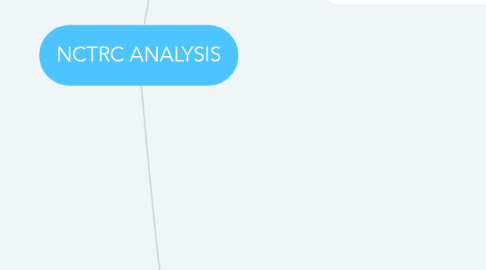NCTRC ANALYSIS
por raisah sheppard


1. Job Task 2. Create/maintain a safe/therapeutic environment 3.8 0.6 1. Establish/maintain effective working relationships 3.8 0.6 15. Establish therapeutic relationship with person(s) served 3.7 0.7 28. Monitor/address safety concerns 3.6 0.7 54. Comply with standards/regulations 3.6 0.7 9. Adhere to professional SOP/code of ethics 3.6 0.7 38. Document occurrences relating to risk management 3.6 0.8 27. Use leadership/facilitation/adaptation techniques 3.5 0.8 53. Follow risk management practices 3.5 0.8 37. Document behavioral observations 3.5 0.9 13. Obtain/review pertinent information 3.5 0.9 29. Observe for response to intervention/program 3.5 0.9 30. Monitor effectiveness of intervention/program 3.5 0.8 31. Evaluate changes in functioning 3.5
2. . Professionalism 3.7 0.6 13. Cognitive/developmental disorders, related impairments 3.6 0.7 23. Social assessment 3.6 0.8 35. Selection of programs 3.6 0.8 52. Advocacy for person(s) served 3.5 0.8 15. Psychiatric disorders and related impairments 3.5 0.9 41. Risk management/safety concerns 3.5 0.8 22. Cognitive assessment 3.5 0.8 26. Leisure assessment 3.5 0.8 10. Code of ethics 3.5 0.8 14. Physical/medical disorders and related impairments 3.5 0.9 25. Affective assessment
2.1. . Human developmental stages 3.1 1.0 2. Human behavior/principles of behavioral change 3.1 1.0 3. Concepts/models of health/human services 3.0 1.0 4. Principles of group dynamics/leadership 3.3 0.9 5. Legislative/regulatory guidelines/standards 3.1 1.0 6. Contributions of play/recreation/leisure 3.4 0.9 7. Models of TR/RT service delivery 2.7 1.1 8. Practice settings 3.2 1.0 9. Standards of practice 3.4 0.9 10. Code of ethics 3.5 0.8 11. Professional qualifications 3.4 1.0 12. Cultural competency 3.4 0.8 13. Cognitive/developmental disorders, related impairments 3.6 0.7 14. Physical/medical disorders, related impairments 3.5 0.9 15. Psychiatric disorders, related impairments
2.2. 16. Current TR/RT assessment instruments 2.7 1.2 17. Interprofessional inventories/questionnaire 2.5 1.2 18. Secondary sources of assessment data 3.1 1.0 19. Criteria for selection and/or development of assessment 2.6 1.2 20. Implementation of assessment 3.2 1.0 21. Sensory assessment 3.2 1.0 22. Cognitive assessment 3.5 0.8 23. Social assessment 3.6 0.8 24. Physical assessment 3.4 0.9 25. Affective assessment 3.5 0.8 26. Leisure assessment 3.5 0.8 27. Functional skills assessment 3.3 1.0 TABLE 3: PROFESSIONAL KNOWLEDGE DOMAINS No. Professional Knowledge Domains Mean SD DOCUMENTATION 28. Interpretation/documentation of assessment results 3.3 1.0 29. Individualized intervention plan 3.4 1.0 30. Writing measurable goals/behavioral objectives 3.3 1.1 31. Progress/functional status 3.0 1.2 32. Modification of intervention plan 3.1 1.1 33. Discharge/transition plan 2.6 1.3 34. Required facility documentation 3.3 1.0 IMPLEMENTATION 35. Selection of programs 3.6 0.8 36. Purpose/techniques of activity/task analysis 3.3 0.9 37. Activity modifications 3.4 0.9 38. Modalities and/or interventions 3.4 0.9 39. Facilitation approaches 3.2 0.9 40. Intervention techniques 3.4 0.9 41. Risk management/safety concerns 3.5 0.8 42. Role/function of other health/human service professions 3.1 1.0 ADMINISTRATION OF TR/RT SERVICE 43. TR/RT service plan of operation 2.4 1.2 44. Procedures for program evaluation/accountability 2.8 1.1 45. Quality improvement guidelines/techniques 2.7 1.1 46. Personnel/intern/volunteer management 2.7 1.3 47. Payment system 2.0 1.4 48. Facility/equipment management 2.6 1.2 49. Budgeting/fiscal management 2.4 1.3 ADVANCEMENT OF THE PROFESSION 50. Professionalism 3.7 0.6 51. Credential maintenance/professional competencies 3.4 1.0 52. Advocacy for person(s) served 3.5 0.8 53. Legislation/regulations 2.7 1.2 54. Public relations/promotion/marketing 2.6 1.3 55. Professional associations/organizations 2.7 1.2 56. Research activities 2.4 1.3 57. Higher education/service provider collaboration 2.5 1.3 No. Tasks Mean SD 2. Create/maintain a safe/therapeutic environment 3.8 0.6 1. Establish/maintain effective working relationships 3.8 0.6 15. Establish therapeutic relationship with person(s) served 3.7 0.7 28. Monitor/address safety concerns 3.6 0.7 54. Comply with standards/regulations 3.6 0.7 9. Adhere to professional SOP/code of ethics 3.6 0.7 38. Document occurrences relating to risk management 3.6 0.8 27. Use leadership/facilitation/adaptation techniques 3.5 0.8 53. Follow risk management practices 3.5 0.8 37. Document behavioral observations 3.5 0.9 13. Obtain/review pertinent information 3.5 0.9 29. Observe for response to intervention/program 3.5 0.9 30. Monitor effectiveness of intervention/program 3.5 0.8 31. Evaluate changes in functioning 3.5 0.8
2.2.1. ADMINISTRATION OF TR/RT SERVICE 43. TR/RT service plan of operation 2.4 1.2 44. Procedures for program evaluation/accountability 2.8 1.1 45. Quality improvement guidelines/techniques 2.7 1.1 46. Personnel/intern/volunteer management 2.7 1.3 47. Payment system 2.0 1.4 48. Facility/equipment management 2.6 1.2 49. Budgeting/fiscal management
2.2.1.1. 50. Professionalism 3.7 0.6 51. Credential maintenance/professional competencies 3.4 1.0 52. Advocacy for person(s) served 3.5 0.8 53. Legislation/regulations 2.7 1.2 54. Public relations/promotion/marketing 2.6 1.3 55. Professional associations/organizations 2.7 1.2 56. Research activities 2.4 1.3 57. Higher education/service provider collaboration 2.5 1.
